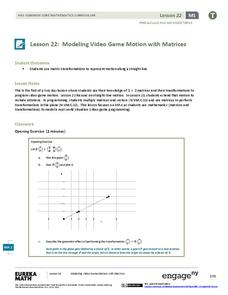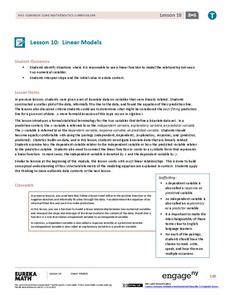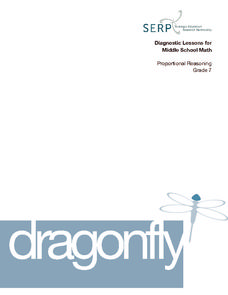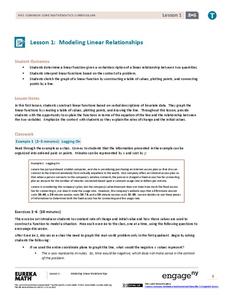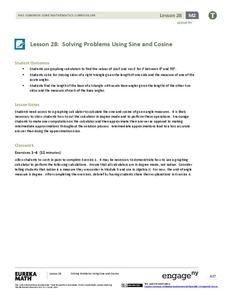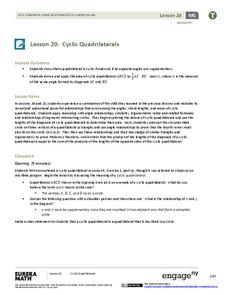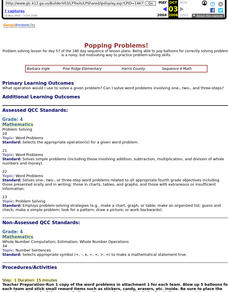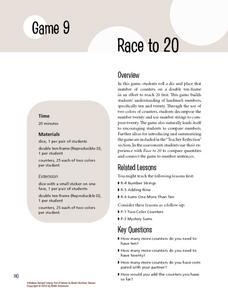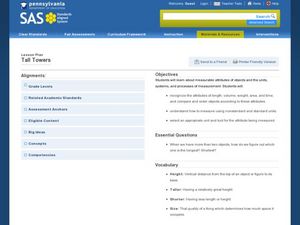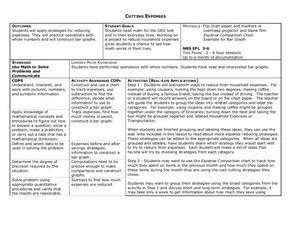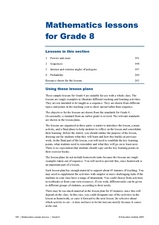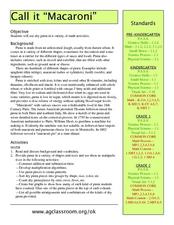EngageNY
Modeling Video Game Motion with Matrices 1
Video game characters move straight with matrices. The first day of a two-day lesson introduces the class to linear transformations that produce straight line motion. The 23rd part in a 32-part series has pupils determine the...
EngageNY
Increasing and Decreasing Functions 2
Explore linear and nonlinear models to help your class build their function skills. In a continuation of the previous lesson, learners continue to analyze and sketch functions that model real-world situations. They progress from linear...
EngageNY
Linear Models
Expand your pupils' vocabulary! Learn how to use statistical vocabulary regarding linear models. The lesson teaches scholars the appropriate terminology for bivariate data analysis. To complete the module, individuals use linear...
Curated OER
Dragonfly
The speed of a dragonfly brings math into the real world as your learners collaboratively see the value in calculating unit rates in direct proportion problems. This six-phase instructional activity encourages you, as the teacher, to...
EngageNY
Modeling Linear Relationships
Math modeling is made easy with the first installment of a 16-part module that teaches pupils to model real-world situations as linear relationships. They create graphs, tables of values, and equations given verbal descriptions.
Armory Center for the Arts
Place Value Collage
How can art represent math? Use a lesson plan on place value collages to illustrate the different meanings that numbers have in their designated places. Kids observe photographs and paintings that show place value, then work on their own.
EngageNY
Modeling with Polynomials—An Introduction (part 1)
Maximizing resources is essential to productivity. Class members complete an activity to show how math can help in the process. Using a piece of construction paper, learners construct a box with the maximum volume. Ultimately, they...
EngageNY
Modeling a Context from a Verbal Description (part 1)
When complicated algebraic expressions are involved, it is sometimes easier to use a table or graph to model a context. The exercises in this lesson are designed for business applications and require complex algebraic...
EngageNY
Ferris Wheels—Using Trigonometric Functions to Model Cyclical Behavior
Have class members going in circles as they model the path of a Ferris Wheel using trigonometric functions. Building on the previous lesson in this series on transformations, learners use trigonometric functions to model wheels of...
EngageNY
Solving Basic One-Variable Quadratic Equations
Help pupils to determine whether using square roots is the method of choice when solving quadratic equations by presenting a lesson that begins with a dropped object example and asks for a solution. This introduction to solving by...
EngageNY
Comparing Quadratic, Square Root, and Cube Root Functions Represented in Different Ways
Need a real scenario to compare functions? This instructional activity has it all! Through application, individuals model using different types of functions. They analyze each in terms of the context using the key features of the...
Curated OER
Budget Bonanza
Students demonstrate how to use a budget plan. In this consumer math lesson, students calculate the total cost of data and determine if they are within budget. Students use calculators to determine the total cost. There is a rubric...
EngageNY
Solving Problems Using Sine and Cosine
Concepts are only valuable if they are applicable. An informative resource uses concepts developed in lessons 26 and 27 in a 36-part series. Scholars write equations and solve for missing side lengths for given right triangles....
EngageNY
Arcs and Chords
You've investigated relationships between chords, radii, and diameters—now it's time for arcs. Learners investigate relationships between arcs and chords. Learners then prove that congruent chords have congruent arcs, congruent arcs have...
EngageNY
Cyclic Quadrilaterals
What does it mean for a quadrilateral to be cyclic? Mathematicians first learn what it means for a quadrilateral to be cyclic. They then investigate angle measures and area in such a quadrilateral.
Curated OER
Popping Problems!
Turn your math lesson into a carnival game with this fun, outdoor activity. After reviewing the concept your class will be practicing briefly, split your class up into teams and head outdoors. These teams work to solve math questions and...
Math Solutions
Race to 20
And they're off! Working in pairs, young mathematicians roll dice to see who can fill in their double ten-frames first. When young scholars finally fill in their arrays, they create addition number sentences that represent their rolls,...
Curated OER
Tall Towers
Linear measurement is the focus of this math lesson. Youngsters work in groups to build towers with blocks. They build towers represented on index cards and determine how many blocks taller one tower is.
Curated OER
Cutting Expenses
Students explore budgeting. In this finance and math instructional activity, students brainstorm ways in which households could save money. Students view websites that give cost reducing ideas. Students complete an expense comparison...
Curated OER
Trading Faces
The game of "Trading Faces" is the focus of this clever math lesson. Your mathematicians use addition to determine the values of different coin combinations by playing the game. Everything you need to implement the game, and the lesson,...
Curated OER
Powers and Roots
Eighth graders determine the square and cube roots of given numbers in this math lesson. They determine the missing number in a sequence. Additionally, they calculate the interior and exterior polygon angles.
Curated OER
Call it "Macaroni"
Who knew there were so many fun educational opportunities featuring pasta? Scholars read a brief informational text about the history of pasta (note that "macaroni" is spelled two different ways, so address this if kids are reading...
Curated OER
Chances Are......You're Right
Young mathematicians study probability. In this math lesson, learners calculate odds, and convert those into percentages of probability. Fractions are also used, making this lesson quite rich in some of the more difficult conversions...
Curated OER
Algebra I: Linear Functions
Using rates from a rental car company, young mathematicians graph data, explore linear relationships, and discuss the role of slope and the y-intercept. This lesson allows for the discussion of independent and dependent variables, as...
Other popular searches
- Multicultural Math Lessons
- Dr. Seuss Math Lessons
- Powerpoint Math Lessons
- Thanksgiving Math Lessons
- Esl Lessons Math
- Elementary Math Lessons
- Math Lessons Place Value
- Kindergarten Math Lessons
- 2nd Grade Math Lessons
- Math Lessons Pre Algebra
- Manipulatives Math Lessons
- Halloween Math Lessons


